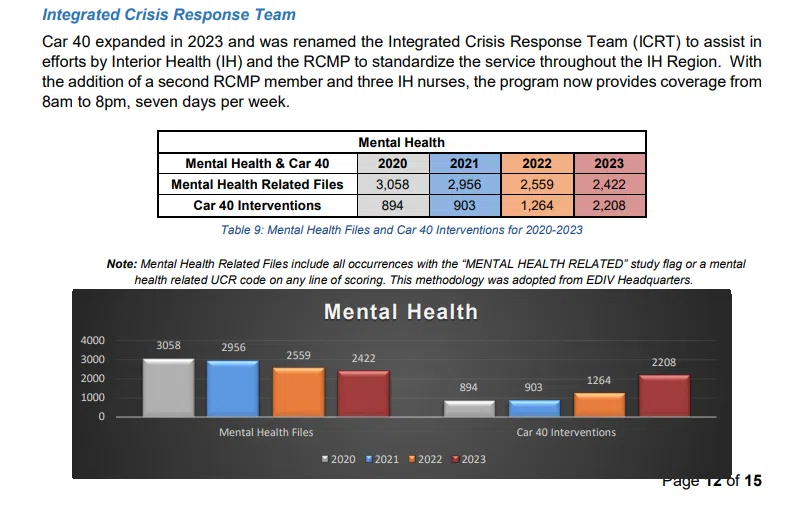
Photo via Interior Health
The head of the Kamloops RCMP says its been a successful first year for the expanded Car 40 program in the city.
Now known as the Integrated Crisis Response Team, Superintendent Jeff Pelley says the RCMP is working on trying to expand the program – which sees a police officer and a nurse respond to mental-health calls – into some of the outlying areas, though he is not sure when that might happen.
“We have advanced a business care with respect to increasing the establishment of this unit into the Tk’emlúps area as well as the rural community serving Kamloops,” Pelley said at the April 16 Safety and Security Committee meeting.
“I don’t have a response on that yet, but we’re going to continue to advocate for that, looking to continue to evolve the program.”
At this time, it is not clear if the expansion of the Integrated Crisis Response Team will require the hiring of additional police officers and nurses.
Kamloops RCMP spokesperson Cpl. Crystal Evelyn told Radio NL that if program expansion went ahead, it would require an increased number of police officers and nurses to manage the increased workload.
The ICRT program is currently operating seven days a week between 8 a.m. and 8 p.m. – instead of the previous 10 hours a day, four days a week – and its still staffed with three nurses and two police officers.
“Over the last year we’ve had a six per cent decrease in mental health and ICRT calls, so from 2,559 down to 2,422 calls,” Pelley said.
“However, the direct correlation of that is there has been a substantial increase in interventions, which is a good thing to start to get to the root issues. We’ve had a 43 per cent in interventions from 1,264 up to 2,208.”

Breakdown of Integrated Crisis Response Team stats as of the end of 2023. (Photo via Kamloops RCMP)
It’s not the first time that Pelley has praised the expanded Integrated Crisis Response Team, having also done so in June of last year.
“Mental health is not a crime. It is usually compounded with a number of other things and we look to address the response and the safety of the individual depending on the nature of the call,” Pelley said. “It could be anywhere from suicidal individual in crisis or domestic disputes that may have a root issue and non-criminal.”
“We are not limited to just criminal code offences, we look at the root issues of mental health as well as individuals in crisis when we’re responding. That being said, we look to increase our productivity with regards to appropriate interventions.”














